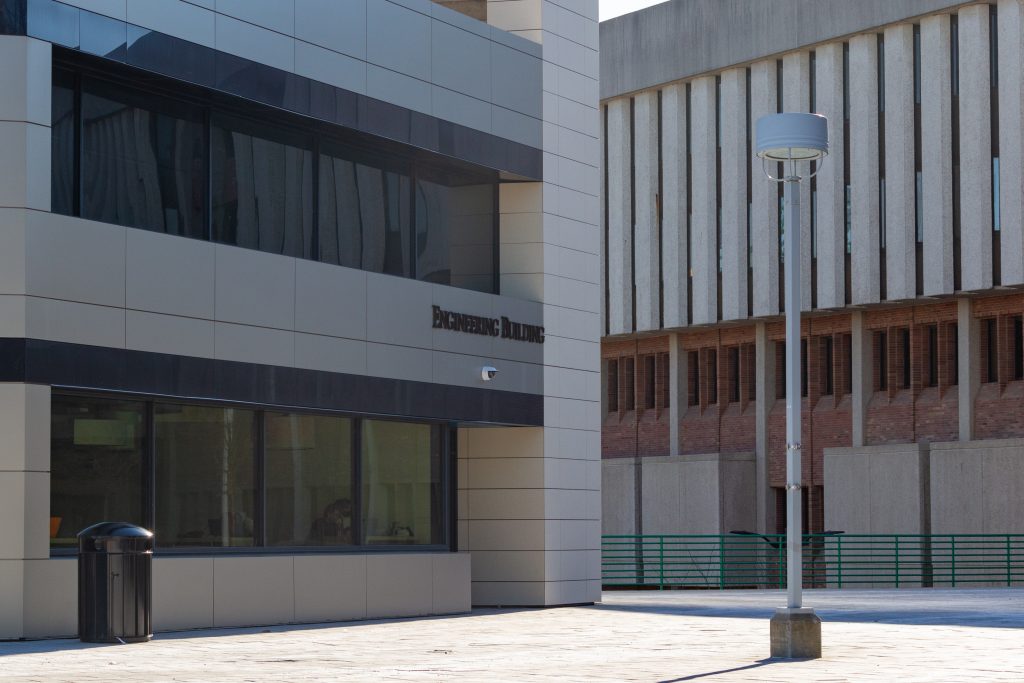A new partnership will allow the Watson College of Engineering and Applied Science to offer qualifying female students free continuing education courses.
The initiative, intended to boost female representation in male-dominated spheres, is funded by the Women in Apprenticeship and Nontraditional Occupations (WANTO) grant, and will give 100 female-identifying students free professional development courses associated with “nontraditional” career fields. The students will be accepted on a first-come, first-served basis and can take one to five Watson College continuing education courses — adding up to $500 worth of tuition — during the spring and summer sessions, with the first cohort of course offerings beginning on March 29. According to a B-Line announcement, those accepted have access to courses ranging from data science to systems engineering.
The self-paced online continuing education courses are open to students, faculty, staff and industry professionals. The goal of the courses are to inspire lifelong learning and enhance course participants’ skills needed to stay competitive in the job market, according to Michael Testani, director of industrial outreach at Watson College.
“The Watson [College] Continuing Professional Education programs provide the opportunity to develop practical and marketable skills that our students (as well as industry professionals) can use to advance their careers,” Testani wrote in an email. “The vast majority of our students post their professional development achievements on social media outlets … like Facebook and LinkedIn, as a great way to build and promote their personal brand.”
Krishnaswami Srihari, the dean of Watson College, thanked Testani and Kimberly Eiche, director of career and alumni connections at Watson College, for working with WANTO to make the partnership possible.
“This is a wonderful opportunity for our female undergraduate and graduate students who may not otherwise be able to take advantage of the fantastic portfolio of courses available through Watson [College’s] continuing education programs,” Srihari wrote in an email.
Funding for the WANTO program will come from a grant administered by the Workforce Development Board of Herkimer, Madison and Oneida Counties, Inc. (WDB/HMO), a regional leader for workforce development services.
Eiche explained how the program aims to assist women in gaining footing in their careers.
“The goal of the WANTO Program (established through [WDB/HMO]) is to help train and employ female-identifying individuals who are interested in pursuing nontraditional career fields,” Eiche wrote in an email. “Nontraditional is defined by the Department of Labor as industries where women make up 25 percent or less of the workforce.”
Stephanie Heiland, project director of WANTO, said the partnership will be a significant opportunity for students.
“We are so excited for this partnership with Binghamton University and having the opportunity to support these students in furthering their education,” Heiland said in an email. “We hope our efforts, along with partnering agencies and institutions, can create a more diverse and equitable workforce and bridge the gap for women entering nontraditional career fields.”
Nicole Dates, an alumnus of the continuing education courses and junior majoring in industrial and systems engineering, encouraged women to apply to the program.
“Watson [College’s] partnership with WANTO is such an excellent initiative that encourages female-identifying students to take certifications in courses they may have not considered before, and it helps these students learn technical skills not focused on in classes,” Dates wrote in an email. “I took my Python certificate while I was doing a Python class here at BU, and it was a really good way to put some of the content I learned into practice.”
Hannah Anderson, a sophomore majoring in biology, said she feels the program will be beneficial to women attempting to enter male-dominated careers.
“I think this partnership will be good,” Anderson said. “It definitely promotes women to go into these fields that they may be interested in but cautious about. There is a large push as of recently to have women in mostly male-dominated fields, and having a monetary benefit will only encourage that goal.”
Testani and Eiche said there are still spots open and encouraged any women in nontraditional fields to apply for the funds.
Astrid Stromhaug, the senior program coordinator at Watson College, said the program presents an opportunity for women to stand out in such fields.
“I believe learning new skills and earning digital badges is a great resume booster and can really make a difference when applying for jobs,” Stromhaug wrote in an email. “I hope as many female students as possible will take advantage of this opportunity.”



